When China set up a new bank – Asian Infrastructure Investment Bank (AIIB) – less than 2 years ago, world superpower United States wasn’t happy about it. The creation of AIIB on 24 October 2014 in Beijing – aims to support the building of infrastructure in the Asia-Pacific region – was seen as rival to World Bank by the U.S. and its allies.
China managed to get 20 other countries – Bangladesh, Brunei, Cambodia, India, Kazakhstan, Kuwait, Laos, Malaysia, Myanmar, Mongolia, Nepal, Oman, Pakistan, Philippines, Qatar, Singapore, Sri Lanka, Thailand, Uzbekistan and Vietnam – and signed a Memorandum of Understanding (MOU) on that historical day.
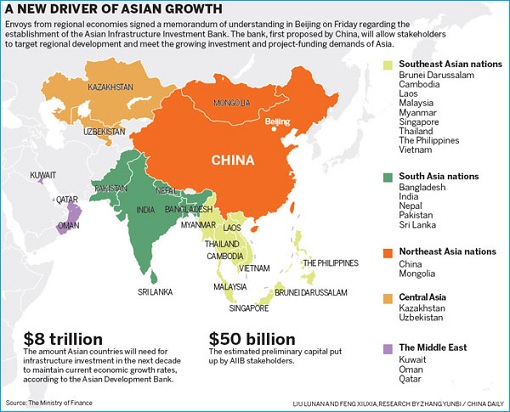
The United States tried to keep its allies such as Australia, South Korea, United Kingdom, Canada, Japan, Germany, France, Italy, Jordan, Netherlands, New Zealand and others from joining the bank, of which 50% of its US$100 billion capital was funded by the super-rich China. AIIB’s membership has since grown to 57 countries, including U.S. allies.
Canada on Wednesday became the first North American country to seek membership in the China-backed Asian Infrastructure Investment Bank. That leaves Japan as the remaining U.S. ally that hasn’t applied to join. Of course, the U.S. is watching from the sideline, couldn’t believe that almost all its allies have crossed over to the other side.
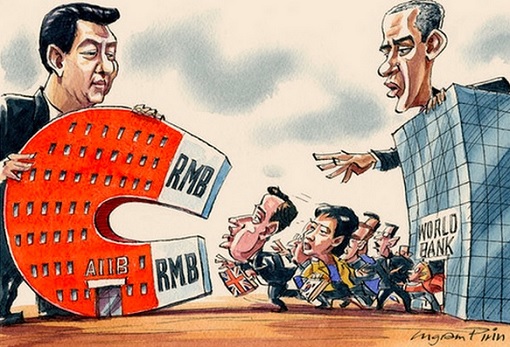
Understandably, the U.S. and Japan may be the only two major powers that will not be part of AIIB, come rain or shine, simply because the bank proposed by China’s President Xi Jinping was considered an attempt to undercut the World Bank and the Asian Development Bank (ADB) – both financial institutions dominated by the U.S. and Japan respectively.
Coming ahead of the Group of 20 meeting in Hangzhou this weekend, Canada’s application followed Prime Minister Justin Trudeau’s Wednesday meeting with Chinese Premier Li Keqiang. President of AIIB, Jin Liqun, said – “The decision of Canada to apply to join AIIB is very welcome and shows its confidence in the strong foundations the bank has built in our first few months.”
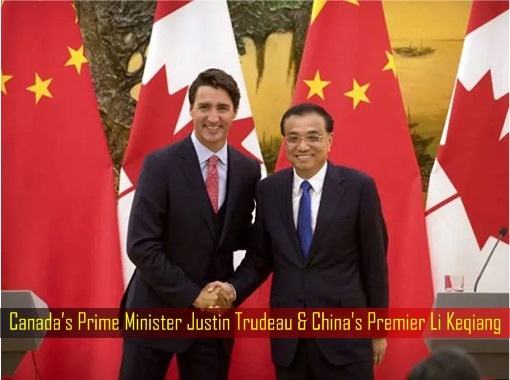
The latest membership application by Canada in the AIIB is seen as a propaganda victory for China. From the start, the U.S. has been raising concerns that the China-led development bank might cut corners on environmental, social and anticorruption standards. With all of the U.S. allies, except Japan, joining AIIB, it’s hard to justify that AIIB lacks standards.
It appears the U.S. usual policy of “you’re either with us or against us” isn’t working well nowadays. Canadian Prime Minister Justin Trudeau also revealed that Beijing had agreed not to impose new restrictions on canola imported from Canada after their meeting, a bottleneck which threatens CA$2 billion (US$1.52 billion) a year of Canadian oil-seed sales to the Asian giant.
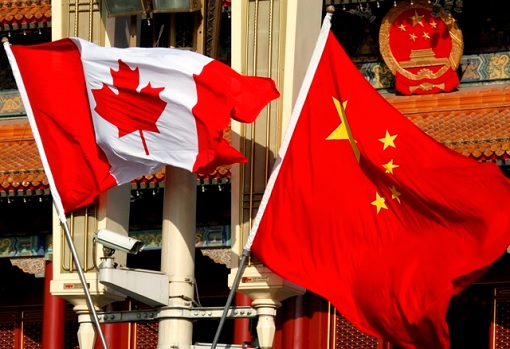
China is Canada’s second-largest trading partner after the United States, with exchanges topping 85 billion Canadian dollars (US$65 billion; £49 billion; RM264 billion) last year. Canadian Finance Minister Bill Morneau said Ottawa believes AIIB will make an important impact on the global economy, therefore, the Canadian economy, through infrastructure investments.
So far, AIIB has already invested more than US$500 million in Bangladesh, Indonesia, Pakistan and Tajikistan, and Chinese officials have said it plans to loan out US$10-15 billion over the next five years. Former Canadian diplomat Charles Burton said joining the bank would signal that Canada is prepared to see China take a leadership seat on the global economic landscape.
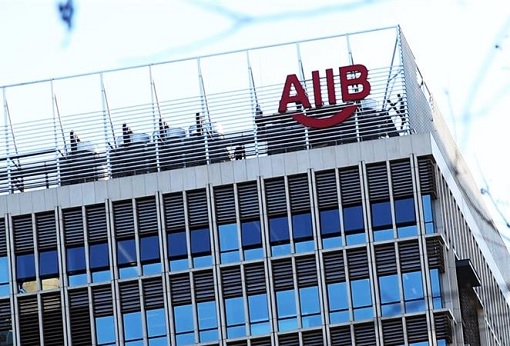
Canada did not specify how much money it would put into the new bank, of which the U.S. allies Australia, Britain, France, Germany and South Korea signed up last year. Countries wishing to join must contribute funds in the form of shares. Australia agreed to contribute US$930 million over 5 years, making that country the sixth-largest shareholder.
However, it’s estimated that Canada could contribute as much as US$1 billion as a shareholder in the AIIB founded by China. Because new members of the AIIB are only added on a yearly basis, Canada’s application, if successful, will not result in admission until 2017. Unlike UK who was heavily criticised by the U.S. when it joined the AIIB, America is expected to play dumb about Canada’s latest stunt.
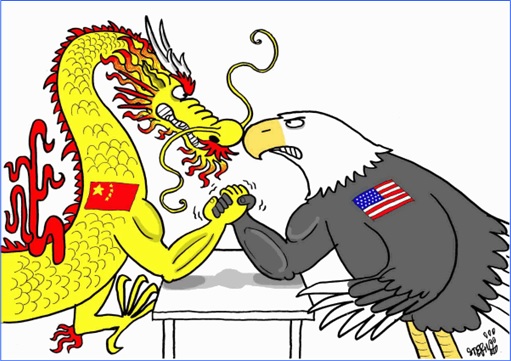
Not many realize this but in actual fact, the controversial Trans-Pacific Partnership (TPP) championed by President Barack Obama was to counter-balance China’s growing economic influence, and to a certain extent the AIIB. Unfortunately, the TPP is being criticised in the U.S. itself, fuelling speculation that the agreement will not see the light of the day eventually.
Evidently, Canadian Prime Minister Justin Trudeau was “looking very seriously” at the Canada-China friendship when he brought not only his own daughter on the trip but also trumpeted about his family ties with China. Apparently, his father – Pierre Trudeau – was the first Canadian prime minister to visit China in 1973.
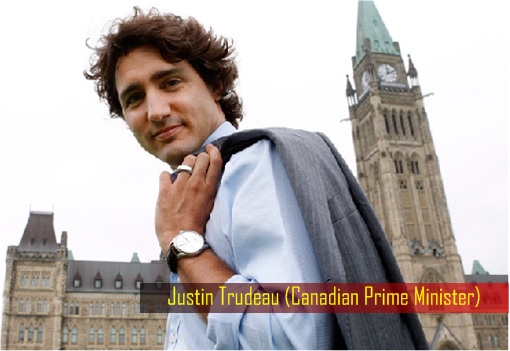
Other Articles That May Interest You …
- Losing Faith In China & Hong Kong – Superman Li Ka-shing To Sell “The Center”
- When America Says “Jump”, Najib Can Only Say “How High”
- U.S. Held Hostage – Obama Secretly Sent A Plane Of $400 Million Cash To Iran
- Tribunal: No Basis To China’s South China Sea Claim, But Who Dares To Enforce It?
- Once The Richest Kingdom, Desperate Brunei Is Now China’s Close Ally
- Riza Aziz’s London Mansion – UK Is “Fantastically Corrupt” For Doing Nothing
- TPPA – It’s A BAD Deal Unless It Benefits Working Class People
- There’s A New Bank On The Block, And The U.S. Isn’t Happy About It

|
|
September 1st, 2016 by financetwitter
|


|

|

|

|

|

|




























Comments
Add your comment now.
Leave a Reply